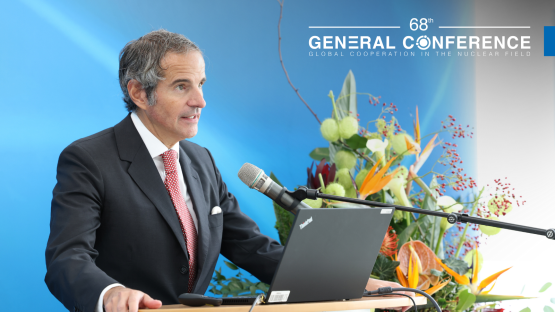Expanding CSC Membership: Countries Share Insights at 68th IAEA General Conference
In his opening remarks, IAEA Director General Rafael Mariano Grossi urges countries to establish a global nuclear liability regime based on the CSC. (Photo D. Calma/IAEA)
During a side event at the 68th regular session of the IAEA General Conference, representatives of several countries highlighted the important role of the Convention on Supplementary Compensation for Nuclear Damage (CSC) in establishing a global nuclear liability regime for achieving the full potential of nuclear energy to address climate change, economic development, and energy security.
During the event, the co-sponsors made a joint statement regarding the CSC, reiterated by Ambassador Atsushi Kaifu, Resident Representative of Japan to the IAEA, noting that: “[a] global nuclear liability regime based on the Convention on Supplementary Compensation on Nuclear Damage (CSC) is key to realizing the full potential of nuclear power to address climate change, economic development, and energy security. Open to all States, the CSC provides for prompt, equitable, and meaningful compensation (including a supplementary international fund) for damage to persons, property, and the environment, and supports legal certainty necessary for operators, suppliers, investors, lenders, and insurers to participate in nuclear power projects. Accordingly, we encourage all IAEA Member States to join the CSC, with a view to establishing the global nuclear liability regime for which the IAEA Action Plan on Nuclear Safety calls.”
The CSC was adopted in 1997 and entered into force in 2015. It is the single instrument covering the greatest number of nuclear power reactors worldwide, approximately 180, or 43 percent of such operational reactors.
In his welcoming remarks, IAEA Director General Mr Rafael Mariano Grossi noted that “by offering a clear path for parties to the other nuclear liability instruments, or States not party to any instrument, to establish treaty relations and ensure appropriate compensation for nuclear damage, the CSC is the single instrument providing the basis for a global nuclear liability regime.” He further added, “I therefore encourage every Member State to consider establishing a global nuclear liability regime on the basis of the CSC.”

Speakers and co-sponsors together with IAEA Director General Rafael Mariano Grossi at the side event on the margins of the 68th IAEA General Conference (Photo: D. Calma/IAEA)
Ambassador Laura S.H. Holgate, Resident Representative of the United States of America to the IAEA, moderated the event. “Being a member of the CSC’s global nuclear liability regime provides a clear signal to the lenders, suppliers, insurers, and most importantly, the public, that a country is serious about clean civilian nuclear power,” she noted in her welcome remarks.
Echoing these words, Ambassador Shambhu S. Kumaran, Resident Representative of the Republic of India to the IAEA, stated that “[t]he provisions of the CSC for early and prompt, as well as equitable and meaningful compensation, are particularly important as these are key elements in ensuring confidence in any liability framework. Further, in providing for damage to persons, property as well as the environment, the Convention enhances the legal certainty that is necessary for all stakeholders across the nuclear energy system, namely operators, suppliers as well as investors, lenders, and insurers to take an active interest in nuclear power projects.”.
Currently, there are 11 CSC Parties (Argentina, Benin, Canada, Ghana, India, Japan, Montenegro, Morocco, Romania, United Arab Emirates and United States of America) and 11 CSC Signatories (Australia, Czech Republic, Indonesia, Italy, Lebanon, Lithuania, Mauritius, Peru, Philippines, Senegal and Ukraine).
Rômulo de Castro Souza Lima, Legal Adviser, Brazilian National Nuclear Energy Commission (CNEN), stated that “For Brazil, it is important to be at the table to discuss its potential accession to the CSC. Although requirements imposed by the regulatory body (National Nuclear Energy Commission - CNEN) on operators, reflect the nuclear liability principles in the CSC, our nuclear liability legislation must be updated. Understanding the mechanisms of the CSC better and demonstrating that Brazil is moving towards accession to this convention is something that is at the forefront of our efforts on this issue.”
This side event was co-sponsored by the IAEA and the United States of America, together with Argentina, Canada, Ghana, India, Japan, Lithuania, Morocco, Romania and the United Arab Emirates.

Representatives from various countries emphasized the pivotal role of the Convention on Supplementary Compensation for Nuclear Damage (CSC). (Photo: D. Calma/IAEA)






